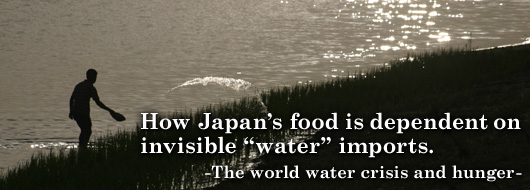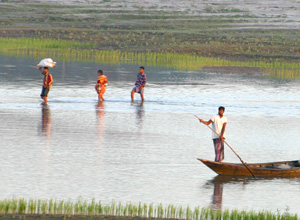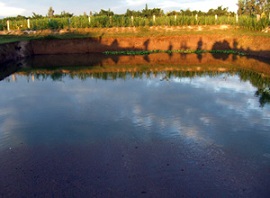No.26 1 Dec. 2009
How Japan’s food is dependent on invisible “water” imports.

INDEX
- P1How Japan’s food is dependent on invisible “water” imports.
- P2How about the state of water globally?
-There is a silently spreading water crisis in the world- - P3Food in Japan, linked to the world’s water problems.
-How the world’s water can be conserved-
Food in Japan, linked to the world’s water problems.
Despite the finite amount of water available globally, increasing populations and changes in diets across the world lead to continued growth in demand for food production and water consumption. Meanwhile, Japan depends on foreign sources for much of its water. The global water crisis is not just other people’s concern.
How the world’s water can be conserved.
Food production creates much of the demand for water, so first and foremost we need to find ways to conserve water used in agriculture. In order to enable agriculture production that is consistent with water conservation, it is necessary to provide technological innovation and support sensitive to local conditions.
Also, it is important to make fundamental changes here in Japan, which is perennially in competition for the lowest rate of food self-sufficiency. According to Ministry of Agriculture, Forestry and Fisheries statistics, approximately 19 million metric tons of food are discarded annually. We import great quantities of food and subsequently throw away great quantities of food — if we reduce this waste, we can conserve both food and the world’s water.

Fresh water fish is a valuable source of protein for Bangladeshis
What we can do?
It is important for each and every one of us to be conscious of our virtual water usage, of how much water we consume daily putting meals on our table and eating out. Naturally, it is not realistic to expect people to identify foods whose production requires a lot of water and eliminate them from their diets.
But it is feasible to at least be conscious of the issue of water lurking in the background, choosing domestically-produced food when possible and buying only what we need to avoid waste, making the first strides to achieve a diet compatible with global water conservation.
By treating each grain of rice we eat as precious, we share not just food, but also water with the rest of the world.
In Bangladesh, one of the countries where HFW is active, the government threw its weight behind developing modern agriculture, modern rice cultivation dependent upon large-scale irrigation in particular. However various problems have arisen from exploitation of water resources, such as salt damage and groundwater depletion.
In response, HFW is promoting organic agriculture that does not depend upon unreasonable irrigation practices. Instead of just cultivating water-intensive rice, we incorporate crops compatible with the local environment. We are also helping prevent overuse of water by employing compost to improve the capacity of soils to hold water, obviating the need for large-scale irrigation to produce sufficient crop yields.

Creating a reservoir to hold rainwater for field irrigation
Calculate how much water you consume in your everyday diet!
Virtual water calculator
The Ministry of the Environment provides a webpage on which you can calculate your virtual water usage depending what you eat, whether rice, bread, meat, vegetables, fruit, etc., and how much.
